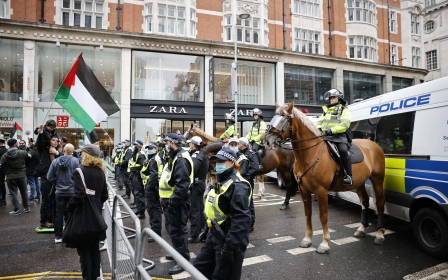UK: NUS reaches ‘substantial’ settlement with former president Shaima Dallali

The UK’s National Union of Students (NUS) has reached a settlement with its former president Shaima Dallali, who was dismissed over allegations of antisemitism in November 2022.
Dallali, who has always rejected the accusations, had subsequently filed a case with an employment tribunal claiming the student body had racially and religiously discriminated against her.
While the terms of the settlement will not be disclosed, both parties have issued a joint statement published on the NUS website, addressing the allegations made against Dallali, as well as subsequent media and social media attacks against her.
Dallali has maintained that she was targeted because of her support for the Palestinian cause and her criticism of Zionist ideology.
In a statement put out in March 2023, Dallali’s lawyers, Carter Ruck, said: "She considers her dismissal (and the unfair process preceding it) to have been motivated by antipathy towards her anti-Zionist, pro-Palestinian protected beliefs, the fact that she supported the Palestinians and her religion as a Muslim."
New MEE newsletter: Jerusalem Dispatch
Sign up to get the latest insights and analysis on Israel-Palestine, alongside Turkey Unpacked and other MEE newsletters
In their joint statement released on Tuesday, the NUS conceded that holding pro-Palestinian and anti-Zionist views are “protected beliefs”.
“As a private individual Ms Dallali is, and as president of NUS she was, entitled to hold protected beliefs,” the statement read.
'Death threats and Islamophobia'
When news first broke of Dallali’s dismissal in 2022, the former City University Student Union president was subject to attacks by members of the tabloid press, social media users and even politicians including Labour's Wes Streeting, the then shadow foreign secretary, who commended the decision to sack Dallali.
The attacks on social media included death threats and attacks on Dallali's Muslim faith.
'Ms Dallali has suffered truly horrific abuse, which has included death threats, threats of sexual assault and flagrant Islamophobia'
- NUS statement
In its statement, the NUS said: “Ms Dallali has suffered truly horrific abuse, which has included death threats, threats of sexual assault and flagrant Islamophobia. This is wholly unacceptable, and NUS categorically condemn it.”
The NUS also made reference to a tweet made on social media by Dallali in 2012. In the joint statement the NUS accepts that the tweet of concern was made when Dallali was a teenager and was not yet a student.
“Both parties accept that Ms Dallali has repeatedly apologised for that tweet. Throughout this matter,” the NUS said.
The settlement agreement ending the proceedings at the employment tribunal suggests financial compensation was paid by the NUS to Dallali.
Both parties agreed to keep the terms of the agreement confidential. However, even before reaching the settlement, the NUS has paid more than a million pounds on investigating its former president and defending her discrimination claim, according to a report by The Times last month.
According to The Times newspaper, “Dallali has been given ‘tens of thousands of pounds’ by the National Union of Students — which has spent over £1m on investigations — in a deal to avert an employment tribunal”.
A legal expert familiar with similar cases told MEE they, "have no doubt the financial compensation for Ms Dallali is certainly quite substantial”.
In a statement put out by her lawyers, Dallali said she was pleased to put the matter behind her.
"I am an anti-Zionist and a proud pro-Palestinian." Dallali said.
"Following today’s settlement, I look forward to being able to focus on continuing to dedicate myself to the Palestinian cause and to serving my community." She added.
"I am immensely grateful to those who have supported me during this difficult chapter in my life and I am pleased that all parties can now move on."
The conclusion to Dallali’s case comes as pro-Palestinian students set up protest encampments across universities in the UK over Israel’s ongoing war on Gaza.
Similar protests in the US have been violently put down by police officers and the US Congress is working on passing legislation equating anti-Zionist activism on campuses to antisemitism.
In February, a British judge ruled that former University of Bristol professor and critic of Israel, David Miller, had been unfairly dismissed and subjected to discrimination over his anti-Zionist views.
Rahman Lowe Solicitors, Miller's representatives, called the judgment a “significant triumph”, establishing that anti-Zionist beliefs are legally protected in the workplace.
Middle East Eye delivers independent and unrivalled coverage and analysis of the Middle East, North Africa and beyond. To learn more about republishing this content and the associated fees, please fill out this form. More about MEE can be found here.





